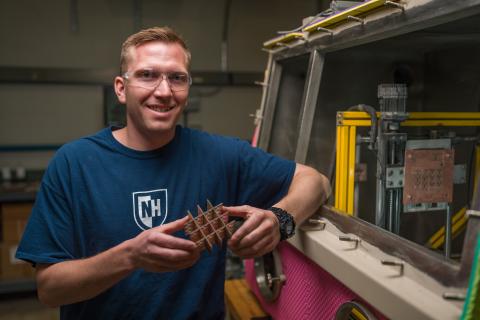
Benjamin Mitchell, a UNH alumnus and recent Ph.D. recipient in Mechanical Engineering, is exploring new research and manufacturing avenues through his start-up business, Drop-Slice. Ben started Drop-Slice at the Olson Center after completing his Ph.D., which focused on a novel waterjet cutting technique that uses droplets to cut, or “slice” through, materials. In addition to being a small business owner, he is a UNH adjunct faculty member and part-time engineer at TurboCam in Barrington, NH.
Through funding from the National Science Foundation (NSF), and with help from the facilities at the Olson Center, and his advisor Brad Kinsey, Ben continues the research he started as a PhD candidate. His work is based on droplet impacts and their capacity to erode high-strength materials, such as steel, in a clean and efficient manner. Ben’s Water Droplet Machining prototype is an eco-friendly and precision-based alternative to the traditional Abrasive Water Jet.
Although traditional abrasive water jet machines have played a crucial role in cutting high-strength materials (metals, aluminum, and titanium steel), they come with drawbacks such as high operating costs, environmental concerns, and difficulties in achieving clean cuts. That is where the concept of water droplet machining, which eliminates abrasives, has emerged as a potential alternative for some specialized applications.
Ben’s machine employs a high-speed water jet within a vacuum environment, where a series of tiny droplets impact the workpiece at high velocities. This technique erodes the material, allowing for precision cutting without abrasive contamination.
The process of droplet formation occurs naturally and is observed in everyday settings, such as a kitchen sink or a shower. By harnessing this phenomenon, water droplet machining achieves narrow cuts with a minimal width, as thin as 10 thousandths of an inch, e.g., 0.010”, comparable to the width of a human hair. The absence of abrasives results in high-quality parts without the risk of abrasive particle embedment or a heat-affected zone.
While water droplet machining demonstrates significant potential, further research and development are required to identify the erosion mechanisms and unlock its full capabilities and viability in the manufacturing industry. Ben is still testing the market for this technology, with ongoing efforts to identify interested industries and establish partnerships. Ben hopes to transition into an original equipment manufacturer and expand the machine's capabilities to handle larger parts, in addition to making process improvements to the original machine.
Water droplet machining has the potential to create new markets and cater to niche applications, such as cutting ceramics, circuit boards, and composite materials. Overcoming the challenges associated with adoption and improving cost-effectiveness will be critical to expanding the reach of this innovative cutting method. Ben is excited to discover just what his machine can do as he feels he has barely scratched the surface.
Written by Katelyn Clark '24
Photo by Jeremy Gasowski